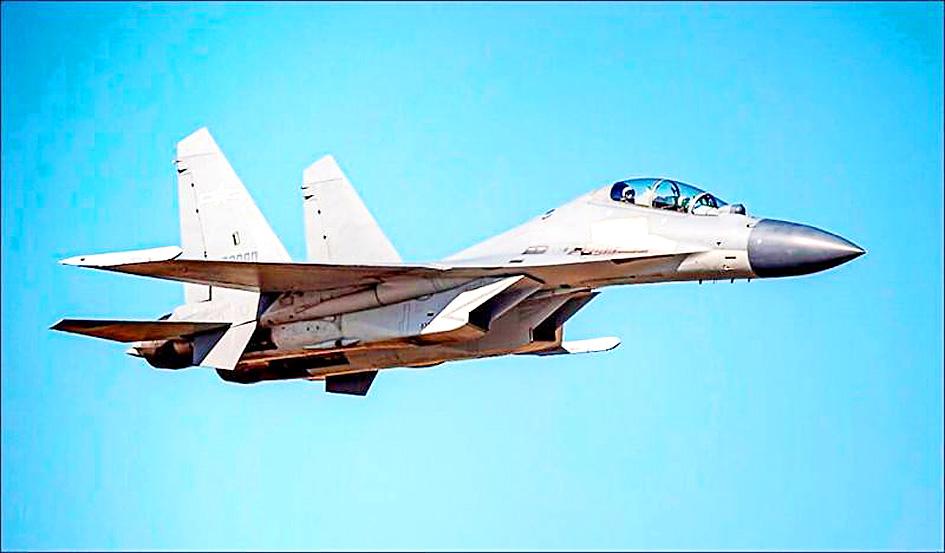US President Joe Biden’s administration on Saturday urged China to stop placing military pressure on Taiwan, while calling on both sides of the Taiwan Strait to engage in peaceful dialogue.
The statement by the US Department of State was issued after 13 Chinese military aircraft flew into Taiwan’s southwest air defense identification zone (ADIZ) on Saturday, the highest number observed in a single day this year, the Ministry of National Defense said.
The air force scrambled fighter jets to monitor the Chinese aircraft, issuing radio warnings and mobilizing air defense assets until the planes left the ADIZ.

Photo courtesy of Ministry of National Defense
The US “notes with concern” the pattern of ongoing attempts by the People’s Republic of China to intimidate its neighbors, including Taiwan, a statement issued by US Department of State spokesman Ned Price said.
“We urge Beijing to cease its military, diplomatic, and economic pressure against Taiwan and instead engage in meaningful dialogue with Taiwan’s democratically elected representatives,” it said.
“We will stand with friends and allies to advance our shared prosperity, security, and values in the Indo-Pacific region — and that includes deepening our ties with democratic Taiwan,” the statement added.
It reiterated Washington’s stance of supporting “a peaceful resolution of cross-strait issues, consistent with the wishes and best interests of the people on Taiwan.”
The statement also said that the US would continue to assist Taiwan in maintaining “sufficient self-defense capability,” as outlined in the Three Joint Communiques, the Taiwan Relations Act and the “six assurances.”
“Our commitment to Taiwan is rock-solid and contributes to the maintenance of peace and stability across the Taiwan Strait and within the region,” it concluded.
The statement was released less than a week after Biden was sworn into office.
The Ministry of Foreign Affairs yesterday said that it sincerely welcomes and thanks the Biden administration for showing support for Taiwan, and for attaching importance to Taiwan’s national defense and security, as well as peace and stability across the Taiwan Strait, soon after taking office.
The ministry would work closely with the administration, and reinforce the close partnership between Taiwan and the US by building on the foundation of their friendship, it said.
The Chinese Nationalist Party (KMT) in a statement also welcomed the US’ support, saying that Democrats have continued to uphold the cross-strait framework of the past 40-plus years, and encouraged cross-strait dialogue.
Regarding the frequent presence of Chinese military aircraft in Taiwan’s airspace, the KMT said that with the Lunar New Year holiday approaching, it urges the Chinese People’s Liberation Army (PLA) to exercise restraint, and not to cause trepidation among Taiwanese.
Chinese authorities should recognize that both sides are responsible for the “knot” in cross-strait relations, which should be resolved peacefully through political means, the party said.
It added that it hopes the governments on both sides prioritize the interests of the people.
Additional reporting by Sherry Hsiao and Lu Yi-hsuan

Seventy percent of middle and elementary schools now conduct English classes entirely in English, the Ministry of Education said, as it encourages schools nationwide to adopt this practice Minister of Education (MOE) Cheng Ying-yao (鄭英耀) is scheduled to present a report on the government’s bilingual education policy to the Legislative Yuan’s Education and Culture Committee today. The report would outline strategies aimed at expanding access to education, reducing regional disparities and improving talent cultivation. Implementation of bilingual education policies has varied across local governments, occasionally drawing public criticism. For example, some schools have required teachers of non-English subjects to pass English proficiency

‘FORM OF PROTEST’: The German Institute Taipei said it was ‘shocked’ to see Nazi symbolism used in connection with political aims as it condemned the incident Sung Chien-liang (宋建樑), who led efforts to recall Democratic Progressive Party (DPP) Legislator Lee Kun-cheng (李坤城), was released on bail of NT$80,000 yesterday amid an outcry over a Nazi armband he wore to questioning the night before. Sung arrived at the New Taipei City District Prosecutors’ Office for questioning in a recall petition forgery case on Tuesday night wearing a red armband bearing a swastika, carrying a copy of Adolf Hitler’s Mein Kampf and giving a Nazi salute. Sung left the building at 1:15am without the armband and apparently covering the book with a coat. This is a serious international scandal and Chinese

TRADE: The premier pledged safeguards on ‘Made in Taiwan’ labeling, anti-dumping measures and stricter export controls to strengthen its position in trade talks Products labeled “made in Taiwan” must be genuinely made in Taiwan, Premier Cho Jung-tai (卓榮泰) said yesterday, vowing to enforce strict safeguards against “origin laundering” and initiate anti-dumping investigations to prevent China dumping its products in Taiwan. Cho made the remarks in a discussion session with representatives from industries in Kaohsiung. In response to the US government’s recent announcement of “reciprocal” tariffs on its trading partners, President William Lai (賴清德) and Cho last week began a series of consultations with industry leaders nationwide to gather feedback and address concerns. Taiwanese and US officials held a videoconference on Friday evening to discuss the

PERSONAL DATA: The implicated KMT members allegedly compiled their petitions by copying names from party lists without the consent of the people concerned Judicial authorities searched six locations yesterday and questioned six people, including one elderly Chinese Nationalist Party (KMT) member and five KMT Youth League associates, about alleged signature forgery and fraud relating to their recall efforts against two Democratic Progressive Party (DPP) legislators. After launching a probe into alleged signature forgery and related fraud in the KMT’s recall effort, prosecutors received a number of complaints, including about one petition that had 1,748 signatures of voters whose family members said they had already passed away, and also voters who said they did not approve the use of their name, Taipei Deputy Chief Prosecutor